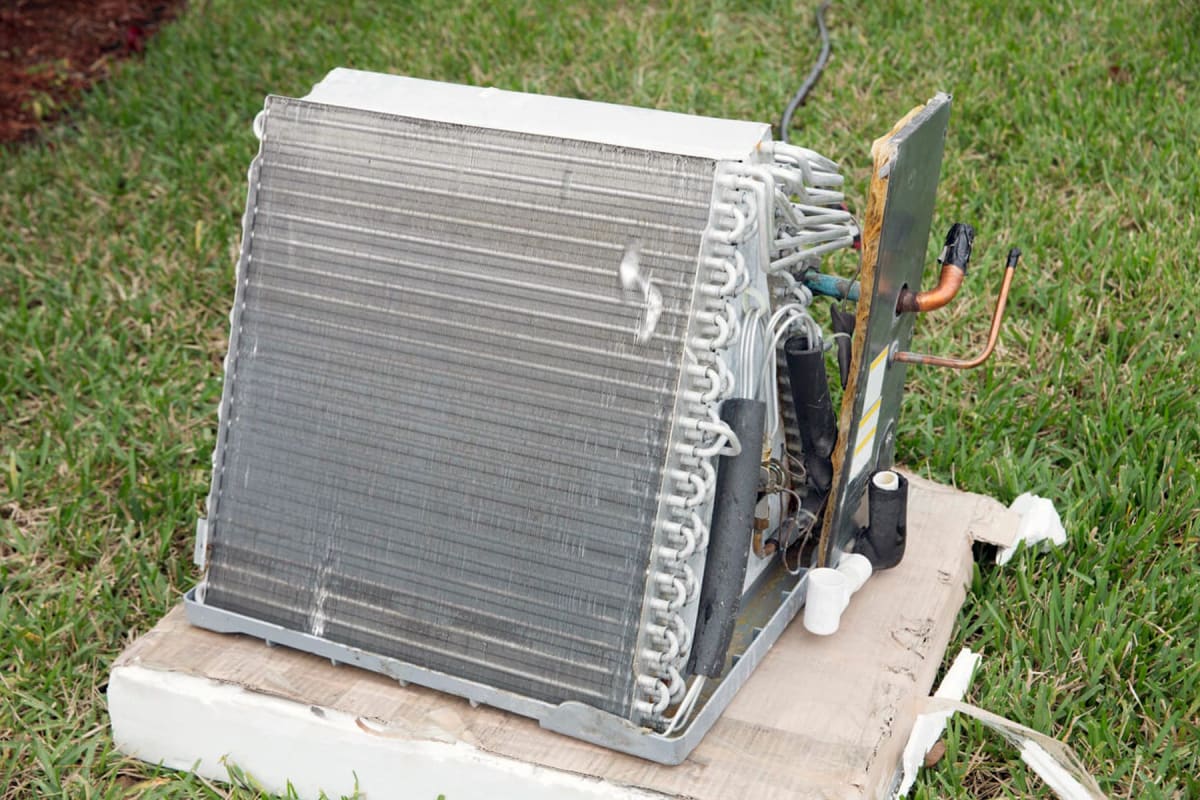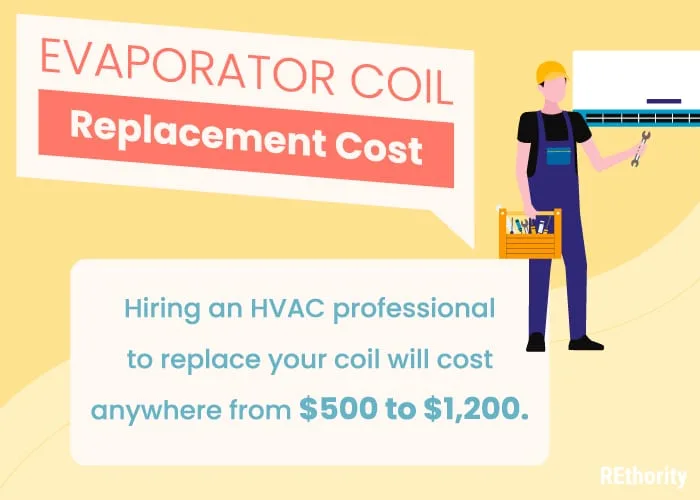How Much Does It Cost To Replace Ac Coil

Understanding the costs associated with replacing an AC coil is crucial for homeowners. An AC coil, also known as an evaporator coil or condenser coil depending on its location, is a critical component of your air conditioning system. When it fails, your AC unit's efficiency and cooling capacity are significantly impacted. This guide breaks down the factors influencing the replacement cost, offering a comprehensive overview to help you make an informed decision.
What is an AC Coil and Why Does it Need Replacing?
Before diving into the cost, let's clarify what an AC coil is and why it sometimes needs replacing. Think of your AC system as having two main sections: an indoor unit and an outdoor unit. The evaporator coil is located inside, usually within your furnace or air handler. Its job is to absorb heat from the air blowing across it, cooling your home. The condenser coil resides in the outdoor unit. It releases the heat absorbed by the evaporator coil to the outside air.
Refrigerant is the lifeblood of your AC system. It circulates through these coils, absorbing and releasing heat. Just like a car needs oil, your AC needs refrigerant to function. The coils themselves are made of metal, typically copper or aluminum, with fins to maximize surface area for heat transfer.
Coils fail for several reasons:
- Leaks: Over time, the metal can corrode or develop pinhole leaks, causing refrigerant to escape. Refrigerant leaks reduce cooling capacity and can damage the compressor.
- Corrosion: Exposure to moisture and chemicals can cause corrosion, weakening the coil's structure. Coastal environments are particularly susceptible to corrosion.
- Physical Damage: Accidents, such as being struck by debris, can physically damage the coils.
- Age: Like any mechanical component, AC coils have a lifespan. As they age, they become more prone to failure.
Recognizing a Faulty AC Coil
Several signs indicate a potential problem with your AC coil:
- Reduced Cooling: Your AC struggles to cool your home adequately.
- Refrigerant Leaks: You might hear a hissing sound or see oily residue near the indoor or outdoor unit.
- Ice Buildup: Ice forming on the evaporator coil (indoor unit) is a common sign of low refrigerant caused by a leak.
- Higher Energy Bills: Your AC unit works harder to compensate for the inefficient coil, leading to increased energy consumption.
- Strange Odors: A musty or moldy smell coming from your vents can indicate a problem with the evaporator coil.
If you notice any of these symptoms, it’s essential to contact a qualified HVAC technician for diagnosis and repair.
Factors Influencing AC Coil Replacement Cost
The cost to replace an AC coil varies depending on several key factors. Understanding these factors will help you get a more accurate estimate.
- Type of Coil: Evaporator coils are typically located inside, making them more accessible and potentially less expensive to replace than condenser coils, which are often located in the outdoor unit and may require more extensive labor.
- Refrigerant Type: Older AC systems used R-22 refrigerant, which is now being phased out. Replacing a coil in an older system might necessitate upgrading to a newer, more environmentally friendly refrigerant like R-410A. This adds to the cost because the entire system might need modifications.
- System Age and Compatibility: If your AC system is old, finding a compatible replacement coil might be challenging. In some cases, it may be more cost-effective to replace the entire AC unit rather than just the coil. Mismatching coils can significantly reduce efficiency and lifespan of your system.
- Coil Material: Copper coils are generally more durable and efficient than aluminum coils but also more expensive. Some manufacturers use a combination of copper and aluminum.
- Labor Costs: Labor costs vary depending on your location and the HVAC contractor's rates. Complex installations that require significant modifications will increase labor costs.
- Accessibility: How easily the technician can access the coil impacts the labor time and therefore the cost. Tight spaces or difficult configurations can add to the expense.
- Warranty: The warranty on the replacement coil can affect the overall cost. A longer warranty provides more protection against future failures, but the initial cost might be higher.
- Contractor Fees: Different contractors have different overhead costs and pricing structures. Obtaining multiple quotes is crucial to finding the best value.
Average Cost Range for AC Coil Replacement
Generally, the cost to replace an AC coil can range from $800 to $2,500 or even higher, depending on the factors mentioned above. Here's a more detailed breakdown:
- Evaporator Coil Replacement: $800 - $2,000. This includes the cost of the coil itself, labor, and refrigerant.
- Condenser Coil Replacement: $1,000 - $2,500. Condenser coil replacements are often more expensive due to the outdoor location and complexity of the unit.
- Refrigerant Costs: Adding refrigerant can cost $100 - $400 depending on the amount needed and the type of refrigerant used. R-22 is more expensive (if you can even find it) due to its phase-out.
These are just estimates, and the actual cost can vary significantly. The best way to get an accurate estimate is to contact several local HVAC contractors and request quotes.
Additional Costs to Consider
Beyond the basic coil replacement, be aware of potential additional costs:
- Refrigerant Recharge: If the old coil leaked refrigerant, the new coil will need to be recharged. The cost of refrigerant depends on the type and quantity needed.
- Ductwork Modifications: In some cases, replacing the coil might require modifications to the ductwork, especially if you're upgrading to a different size or type of coil.
- Electrical Work: If the electrical connections need to be upgraded or repaired, this will add to the cost.
- Whole System Replacement: If your AC unit is very old or the repair costs are high, replacing the entire system might be a more cost-effective long-term solution.
- Permits: Depending on your location, you may need to obtain a permit for AC repairs or replacements.
When to Repair vs. Replace the AC Coil
Sometimes, a small leak in the coil can be repaired. However, whether to repair or replace depends on several factors:
- Size and Location of the Leak: Small, easily accessible leaks might be repairable. Large or multiple leaks usually warrant replacement.
- Age of the Coil: If the coil is old and showing signs of wear, replacement is often the better option.
- Cost of Repair vs. Replacement: Get estimates for both repair and replacement. If the repair cost is close to the replacement cost, replacement is usually more logical.
- Warranty: A repair might void the warranty on other components of your AC system.
Your HVAC technician can advise you on the best course of action based on the specific circumstances.
Tips for Saving Money on AC Coil Replacement
Replacing an AC coil can be a significant expense, but there are ways to potentially save money:
- Get Multiple Quotes: Obtain quotes from at least three reputable HVAC contractors. Compare their prices, warranties, and services.
- Consider Off-Season Replacement: HVAC contractors are often less busy during the off-season (spring and fall), so you might be able to negotiate a better price.
- Look for Rebates and Incentives: Check with your local utility company and government agencies for rebates or incentives on energy-efficient AC equipment.
- Maintain Your AC System: Regular maintenance, such as cleaning the coils and changing the air filter, can help prevent premature coil failure.
- Consider a Home Warranty: A home warranty might cover the cost of AC coil replacement, but be sure to read the fine print and understand the coverage limits.
- Ask About Financing Options: Some HVAC contractors offer financing options to help spread out the cost of the replacement.
Choosing the Right HVAC Contractor
Selecting a qualified HVAC contractor is crucial for a successful AC coil replacement. Consider these factors:
- Licensing and Insurance: Ensure the contractor is properly licensed and insured.
- Experience: Choose a contractor with experience in AC coil replacements, particularly with your type of system.
- Reputation: Read online reviews and ask for references from past customers.
- Certifications: Look for contractors certified by organizations like NATE (North American Technician Excellence).
- Warranty: Inquire about the warranty on both the coil and the labor.
- Clear Communication: The contractor should be able to explain the problem, the recommended solution, and the associated costs clearly and understandably.
Conclusion
Replacing an AC coil is an investment that can restore your AC system's efficiency and cooling capacity. By understanding the factors influencing the cost, obtaining multiple quotes, and choosing a qualified HVAC contractor, you can make an informed decision that fits your budget and ensures a comfortable home environment. Don't delay getting a professional opinion if you suspect a problem with your AC coil; addressing it promptly can prevent more costly repairs down the line.










